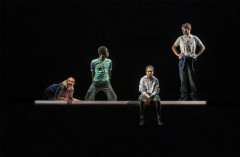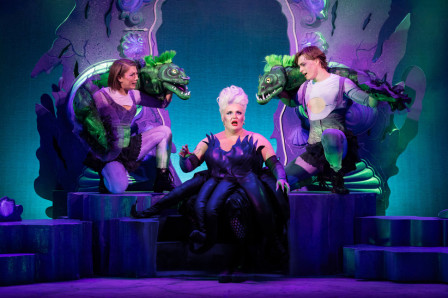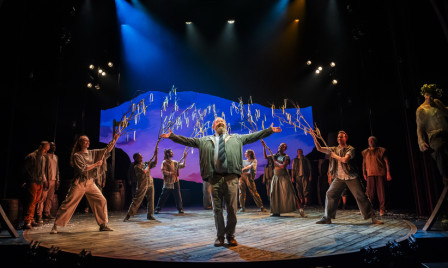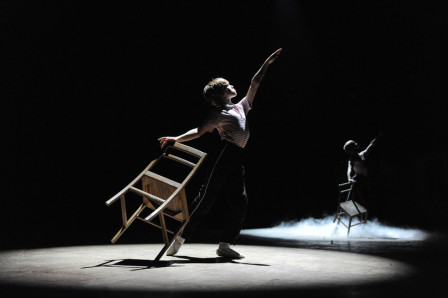Review: GLASS.KILL.BLUEBEARD.IMP at The Royal Court Theatre
 Caryl Churchill is one of Britain’s most celebrated playwrights. The power behind Churchill’s writing lies with her ability to constantly reinvent her worlds whilst exploring the most sinister and political aspects of our society. Quite frankly, Caryl Churchill is a national treasure and her new work, four plays GLASS.KILL.BLUEBEARD.IMP playing at The Royal Court, are a reminder of that.
Caryl Churchill is one of Britain’s most celebrated playwrights. The power behind Churchill’s writing lies with her ability to constantly reinvent her worlds whilst exploring the most sinister and political aspects of our society. Quite frankly, Caryl Churchill is a national treasure and her new work, four plays GLASS.KILL.BLUEBEARD.IMP playing at The Royal Court, are a reminder of that.
Churchill’s passion for storytelling and insistence or pushing her audience imagination is a skill of a real master. GLASS.KILL.BLUEBEARD.IMP is a four segment journey; a theatrical experience accompanied by being entertained by a female juggler and a female athlete in between the pieces. Everything is thought through and planned, and yet the magic prevails.
The first piece, Glass, depicts the story of a girl made of glass (Rebekah Murrell). It is the shortest of all pieces and the most magical one. Murrell performs with both the youthfulness and angst of a young girl who likes when the light shines through her. There is a real sense of mythical story-telling in Churchill’s words and Miriam Buether set design and lights by Jack Knowles create a sense of eeriness that grows as the evening progresses.
Kill is an astonishing piece of writing and it feels like Churchill’s words become bullets. The futility of war and murder and power, and everything in between is explored in this surreal and comical monologue delivered by Tom Mothersdale as the gods, who as admits a few times, don’t exist, we, the people make them up.
The penultimate piece Bluebeard’s Friends is set a dinner party, where four friends learn that their good friend Bluebeard has murdered all his wives. Starring Deborah Findlay, Toby Jones, Sarah Niles and Sule Rimi, the piece examines the complexity around society’s relationship to the abuse of women. The visuals in this scene are both terrifying and striking, especially in relation to how quickly our sympathies for the characters disappear. Churchill scrutinises our complicity post #MeToo and does so in a brutal and honest way.
The final and longest piece Imp stays within the realm of eeriness and darkness, perhaps even more so, as audiences accommodate to Churchill’s world. Here Toby Jones and Deborah Findlay play Jimmy and Dodd, a typical odd couple; two cousins living together. Although this is the piece that relies more on naturalism than the previous three, it is the kind of naturalism that is subtle, and real and never too empphatic. The kind of naturalism that I would say is strongly missed in the British theatre. Both Jones and Findlay are terrific and perfectly at home in this simple, yet mesmerising piece.
Although in moments Churchill creates spaces for bolder and visually led decisions, James Macdonald directs with precision and skill. GLASS.KILL.BLUEBEARD.IMP is a haunting and vital watch in these troubled times.
Latest News

 Is The Great Gatsby, starring Regé-Jean Page, heading to the West End?
11 February 2026 at 15:40
Is The Great Gatsby, starring Regé-Jean Page, heading to the West End?
11 February 2026 at 15:40

 Production photos of UNFORTUNATE: THE UNTOLD STORY OF THE SEA WITCH released
11 February 2026 at 15:14
Production photos of UNFORTUNATE: THE UNTOLD STORY OF THE SEA WITCH released
11 February 2026 at 15:14

 Review Round-Up: THE UNLIKELY PILGRIMAGE OF HAROLD FRY at the Theatre Royal Haymarket
11 February 2026 at 14:19
Review Round-Up: THE UNLIKELY PILGRIMAGE OF HAROLD FRY at the Theatre Royal Haymarket
11 February 2026 at 14:19

 BILLY ELLIOT THE MUSICAL returns to the West End for a limited season
11 February 2026 at 13:50
BILLY ELLIOT THE MUSICAL returns to the West End for a limited season
11 February 2026 at 13:50
